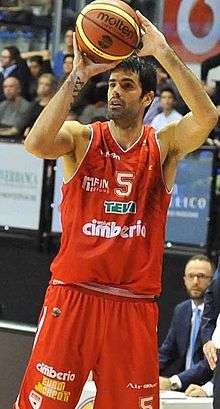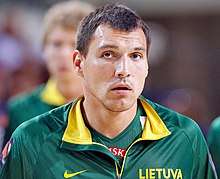A.E.K. (sports club)
A.E.K. (Greek: AEK [ˈaek], formally Αθλητική Ένωσις Κωνσταντινουπόλεως; Athlitikí Énosis Konstantinoupόleos, Athletic Union of Constantinople), known as AEK, is a major Greek multi-sport club based in Nea Filadelfeia, Athens. The club is more commonly known in European competitions as A.E.K. Athens.[1]
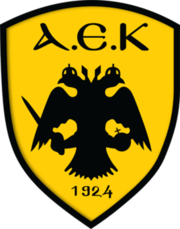 | |
| Full name | Αθλητική Ένωσις Κωνσταντινουπόλεως Athlitikí Énosis Konstantinoupόleos (Athletic Union of Constantinople) |
|---|---|
| Nicknames | Vasílissa (Queen) Énosis (Union) Kitrinómavri (The Yellow-Blacks) Dikéfalos Aetós (Two-Headed Eagle) |
| Founded | 13 April 1924, Athens |
| Based in | Athens, |
| Colours | Yellow, Black |
| Anthem | Empros tis AEK palikaria (Christos Kolokotronis, Stelios Kazantzidis) A.E.K. club anthem |
| Chairman | Alexandros Alexiou |
| Titles | Ιntercontinental Titles: 1 European Titles: 3 |
| Website | www |
| Departments of AEK Athens | ||
|---|---|---|
| Football | Basketball | Volleyball (Men's) |
| Handball | Water Polo | Volleyball (Women's) |
| Futsal | Athletics | Cycling |
| Table tennis | Boxing | Fencing |
| Field hockey | Rugby | Chess |
| Muay Thai | MMA | Weightlifting |
Established in Athens in 1924 by Greek refugees from Constantinople after the 1919–22 Greco-Turkish war and the subsequent population exchange between Greece and Turkey, it is one of three most popular clubs in Greece and of the Greek diaspora. While it fields teams in many sports under the umbrella of its amateur sports arm, Amateur AEK(Greek: Ερασιτεχνική ΑΕΚ; Erasitechnikί AEK), it is best known for its professional football team which is the most successful Greek club in European achievements (participating at the Semi-Final of Europa League in 1977), having also obtained 12 Greek Championships, 15 Greek Cups, 1 Greek League Cup, 1 Pre-Mediterranean Cup, 3 Greek Super Cups) and also for the professional basketball team which has won the Greek Basket League eight times, the Greek Basket Cup five times, the FIBA Saporta Cup twice, once the FIBA Basketball Champions League and once the FIBA Intercontinental Cup.
History
1924–1945

The large Greek population of Constantinople, not unlike those of the other Ottoman urban centres, continued its athletic traditions in the form of numerous athletic clubs. Clubs such as Énosis Tataoúlon (Ένωσις Ταταούλων) and Iraklís (today Kurtuluş S.K.) (Ηρακλής) from the Tatavla district, Mégas Aléxandros (Μέγας Αλέξανδρος) and Ermís (Ερμής) of Galata, and Olympiás (Ολυμπιάς) of Therapia existed to promote the Hellenic athletic and cultural ideals. These were amongst a dozen Greek-backed clubs that dominated the sporting landscape of the city in the years preceding World War I. After the war, with the influx of mainly French and British soldiers to Constantinople, many of the city clubs participated in regular competition with teams formed by the foreign troops. Taxim, Pera, and Tatavla became the scene of weekly competitions in football, athletics, cycling, boxing and tennis.
Ermís, one of the most popular clubs, was formed in 1875 by the Greek community of the city.
Another club of Pera (Galata), known as Pera, since the mid-1880s, forced to change its name to Pera Sports Club, and then Beyoğlu S.K., in 1923. Many of its athletes, with those of the other sporting clubs, fled during the population exchanges at the end of the Greco-Turkish War, and settled mainly in Athens and Thessaloniki.[2]
In 1924, the founders of AEK - a group of Constantinopolitan refugees (among them many athletes from the Pera Sports Club and the other Constantinopolitan clubs) - met at the athletic shop "Lux" of Emilios Ionas and Konstantinos Dimopoulos on Veranzerou Street, in the center of Athens, and created AEK.[3] Their intention was to create a club that provided athletic and cultural diversions for the thousands of predominantly Constantinopolitan and Anatolian refugees who had settled in the new suburbs of Athens (including Nea Filadelfeia, Nea Ionia, Nea Chalkidona, Nea Smyrni).
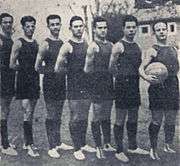
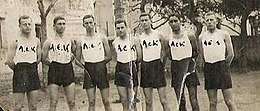
AEK's first president, Konstantinos Spanoudis (1871–1941), a journalist and associate of the Prime Minister Eleftherios Venizelos, petitioned the government to set aside land for the establishment of a sports ground. In 1926, land in Nea Filadelfeia that was originally set aside for refugee housing, was donated as a training ground for the refugees' sports activities. AEK began using the ground for training, albeit unofficially.
In 1930, the property where AEK trained was officially signed over to the club. Venizelos soon approved the plans to build what was to become AEK's home ground for the next 70 years, the Nikos Goumas Stadium. The liberal politician was present at the inauguration of the stadium.
AEK Athletics Club was established in 1924 and is one of the most successful departments of AEK. One of the first sections of the AEK athletic club was cycling. M. Kaloudis was a winner in the Balkan Games (in 1940 in Bucharest when he was third) and was one of the founders of the Chamber. He first appeared in 1929 and was followed by Petoun, Tarsinian and Krisalis. Another cycling ace was Kouvelis, who won the gold medal in the Balkan Games of 1940 in the race of 33 kilometers. Both Kaloudis and his Kouvelis participated in the Olympic Games in London in 1948.
1945–1960
In the Olympic Games of 1948 in London, M. Kaloudis led to the new excursion of AEK in cycling. At the beginning of the 1950s, the sport had blossomed and AEK competed with Panionios and Panathinaikos. The department then had a plethora of skilled cyclists as Davouti, Kouyioumtzis (won the race Athens-Loutraki 1952), Chatziargyri, Georgiadis, Arapi, Barda, Alexis, Tzioti, Barla, Trasian, etc.
AEK Table Tennis Club acquired the third position, both in men and in young men championships, in Greece in 1959. AEK Athens Table Tennis (ping-pong) Club, participated in Greek championships during the decades of 1950s, 1960s, 1970s and 1980s.
1961–1970
AEK was the first ever Greek basketball team to participate in the FIBA European Champions Cup (now called the EuroLeague) Final Four, in 1966, which was held in Bologna, Italy. Two years later, AEK was the first-ever Greek team, not only to reach a FIBA European Cup Winners' Cup Final, but also to win a European-wide title. On April 4, 1968, AEK captained by Giorgos Amerikanos, defeated Slavia VŠ Praha, by a score of 89–82, in Athens, in front of 80,000 spectators (at the time, the Guinness world record in basketball attendance) in Kallimarmaron Stadium.
AEK Athens V.C. is the volleyball team of the Greek sports club AEK. It was re-founded in 1967 by Jason Platsi. Over the years AEK have struggled to stay in the top flight of Greek volleyball, competing in A2 (Greece's second division) and A1.
The Boxing Club was founded in 1969 and during the 1970s had its first success.
1971–1980
The football team, with star player the striker Thomas Mavros, reached the semi-finals of UEFA Cup in 1977, where they were eliminated by Juventus. The Italian team eventually won the trophy.
With many star players they continued appearing in European (UEFA Champions League and UEFA Cup) competitions.
1981–1990
AEK Table Tennis Club acquired the third position in Greek Cups of 1984 and 1985. The relevant department of AEK was inactive for almost 23 years (1986–2009).
1991–2000
The football team, under the guidance of ex-player Dušan Bajević won three consecutive championships in 1992, 1993 and 1994.
Since 1995, AEK also has a women's volley club team, which has advanced to the final of the Greek Cup (2011).
The department of fencing was founded in 1996.
The basketball team reached the FIBA EuroLeague's Final Four in Barcelona in 1998, and beat Benetton Treviso, by a score of 69–66, before losing in the EuroLeague Final to Kinder Bologna, by a score of 44–58. In 2000, on 11 April, AEK won their second international trophy, the FIBA Saporta Cup, by defeating Kinder Bologna 83–76.
The biggest success for the boxing department came in the late 1990s, with Tigran Ouzlian, Artur Mikaelyan and Mike Arnaoutis (who became a professional boxer in the United States).
2001–2010
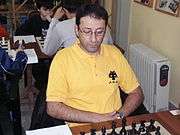
.jpg)
AEK H.C. is also another growing department of AEK. It was founded by a decision of the General Assembly of AEK on July 12, 2005. On August 5, 2005, the Greek Handball Federation accepted a merger of GA Ilioupolis with the Handball Sports Union of Constantinople. In 2007 AEK HC was 3rd in A1 and gained the first participation in European Cups. On 31 May 2009, AEK HC won the Greek Cup in Serres.
The department of AEK Futsal Club was established in 2008 by a merger with Enosi Geraka futsal team and participated in B'Ethniki (second division), where it finished first at the regular season and second after play-off games. However, for the period 2009–10 AEK futsal club is playing again at B'Ethniki, due to a decision taken by EPO (Greek Football Federation), forbidding all team mergers generally. AEK Futsal Club terminated at second position of B'Ethniki after play-off games in April 2010 and gained the participation in A'Ethniki (first division) for the period 2010–11 and has been advanced to the semi-finals of the Greek Cup (2011).
The Chess department was founded by a decision of the General Assembly of AEK on 12 July 2005. The department staffed directly by 3 September 2005 is a member of the Greek Chess Federation. In 2006 AEK Chess Club was Greek Cup finalist and in 2008 Greek Cup semi-finalist (third place). Also won the Attica Cup in 2006 and the Attica Rapid Championships in 2006, 2009 and 2010. In 2010 participated at A' Ethniki (1st Division) and took the seventh place.
AEK VC had its finest moment with coach Stelios Prosalikas, as has prevailed in the final four of the European Cup Winners Cup. The races held (9–10 March 2000) in the closed Nea Liosia and AEK lost in the semi-final by Cuneo, but won 3–1 Galatasaray in the small final and won the third place.
2011–2020
In 2011, AEK FC won the Greek Cup.
In 2011, AEK HC won the Greek Championship.
Also, on 26 February 2011, AEK HC advanced to the quarter-final (best 8) of European Challenge Cup by defeating Sporting Lisboa.
In 2012, AEK WVC won the Greek Women Championship.
In 2013, AEK HC make Double won the Greek Championship and the Greek Cup.
In 2014, AEK HC won the Greek Cup.
In 2014, AEK VC won the Greek Men's League Cup.
In 2016, AEK FC won the Greek Cup.
In 2018, AEK BC won the FIBA Champions League and the Greek Cup.
In 2018, AEK FC won the Greek Championship.
In 2018, AEK Futsal[4] won the Greek Cup.
Also, in 2018, AEK HC reached the final of Challenge Cup.
In 2019, AEK BC won the FIBA Intercontinental Cup.
In 2019, AEK Futsal won the Greek Championship.
In 2019, AEK Women's Futsal won the Hellenic Futsal Greek Championship.
Crest and colours
Since the club's foundation AEK adopted the image of a double-headed eagle on a golden yellow background. The emblem and colours were chosen as a reminder for the lost homelands and they represent the club's historical ties to Constantinople. Its usage also survived as a decorative element in the Greek Orthodox Church, which was the inheritor of the Byzantine legacy during the Ottoman Empire, while it remained a popular symbol among Greeks. In modern Greece various variations of the two-headed eagles are used in Church flags (based on Byzantine flag patterns and heraldic emblems) and officially by the Hellenic Army; the bird found also its way into the Greek coat of arms for a brief period in 1925–1926.[5]
Departments
AEK is an amateur multi-sports club with the mission to create and advance as many sports as it is possible and its main professional and semiprofessional teams operate independently.
The club has teams in many sports, including athletics, cycling, boxing, chess, fencing, table tennis, wrestling, weightlifting, gymnastics, swimming, water polo both male and female teams, tennis, badminton, rugby, kickboxing, taekwondo, brazilian jiu-jitsu, wheelchair basketball and esports, but its most popular teams primarily compete in association football, basketball, volleyball, handball and futsal.
Titles
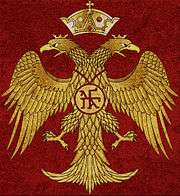
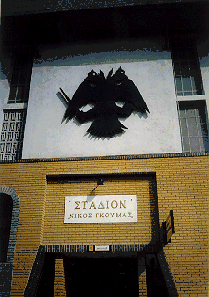
A.E.K. Football Club
- Greek Championships (12):
- 1939, 1940, 1963, 1968, 1971, 1978, 1979, 1989, 1992, 1993, 1994, 2018
- Greek Cup (15):
- 1932, 1939, 1949, 1950, 1956, 1964, 1966, 1978, 1983, 1996, 1997, 2000, 2002, 2011, 2016
- Greek League Cup (1):
- 1990 (record)
- Greek Super Cup (3): 1971, 1989, 1996
- Pre-Mediterranean Cup (1):
- 1991 (record)
A.E.K. Basketball Club
- Intercontinental Cup (1):
- 2019
- European Cup Winners' Cup / Saporta Cup (2):
- 1968, 2000
- Champions League (1):
- 2018
- Greek Championships (8):
- 1958, 1963, 1964, 1965, 1966, 1968, 1970, 2002
- Greek Basketball Cup (5):
- 1981, 2000, 2001, 2018, 2020
A.E.K. Rugby League
- Greek Championship 9's (2): 2018, 2019
- Greek Championship 13's (2): 2018, 2019
Women
- Hellenic Futsal Super League Women (1)
- 2019
A.E.K. Cycling
- Greek Championship, Overall Standings (10)
- 1960, 1961, 1962, 1964, 1965, 1966, 1968, 1975, 1979, 1981
A.E.K. Boxing
- Greek Championship, Men (6)
- 1978, 1980, 1995, 1999, 2000, 2006
A.E.K. Athletics
- Greek Cross-Country Championships (men) 10:
- 1937, 1946, 1957, 1958, 1959, 1960, 1961, 1962, 1963, 1964
- Greek Championship, Women 4:
- 2011, 2012, 2013, 2014
- Greek Indoor Championship, Women 3:
- 2011, 2015, 2016
- Greek Cross-Country Championship, Women 3:
- 2010, 2011, 2012
A.E.K. Fencing
- Greek Championship, Women 9:
- 2012, 2013, 2014, 2015, 2016, 2017, 2018, 2019, 2020
- Greek Championship, Men 1:
- 2018
A.E.K. Table Tennis
- Greek Championship, Men (2)
- 2019, 2020
European and Worldwide Honours
| season | men's football | men's basketball | men's handball | men's volleyball |
|---|---|---|---|---|
| 1965–66 | Champions Cup | |||
| 1966–67 | Balkans Cup | |||
| 1967–68 | Cup Winners' Cup | |||
| 1969–70 | Cup Winners' Cup | |||
| 1976–77 | UEFA Cup | |||
| 1997–98 | Euroleague | |||
| 1999–00 | Saporta Cup | CEV Cup Winners' Cup | ||
| 2000–01 | Euroleague | |||
| 2017–18 | Champions League | EHF Challenge Cup | ||
| 2018–19 | Intercontinental Cup | EHF Challenge Cup |
Notable supporters
AEK Presidential history
|
|
Gallery
Football
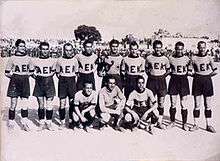 ΑΕΚ in 1925
ΑΕΚ in 1925




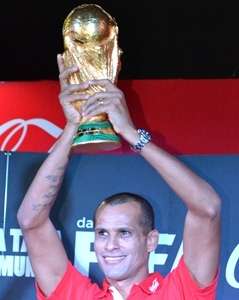


.jpg)

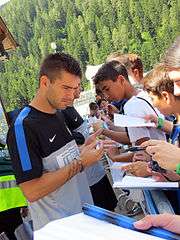
Basketball
References
- cev.lu A.E.K. ATHENS
- [The history of AEK by Panos Makridis. Athlitiki Iho] Newspaper, 1953
- "History of AEK: Born through the ashes". Aekfc.gr. Archived from the original on 2012-05-06. Retrieved 2012-06-07.
- "Top 11 football clubs with futsal sections". futsallfeed.com. Retrieved 2020-04-08.
- "Crest info". Archived from the original on 2008-03-31. Retrieved 2008-03-14.

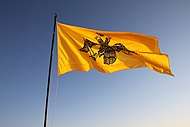
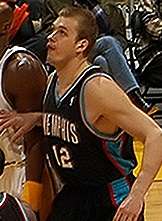

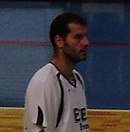
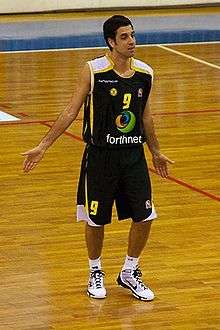
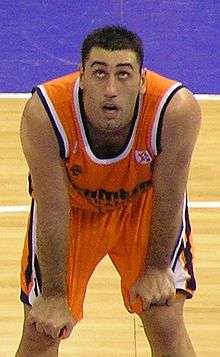
.jpg)

